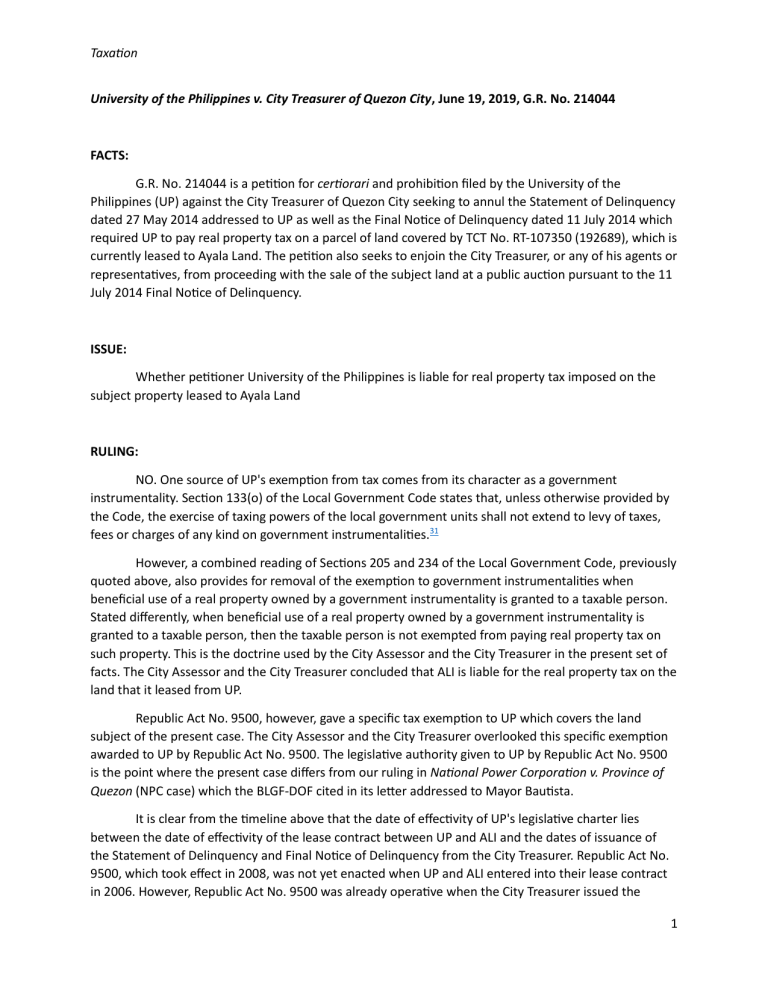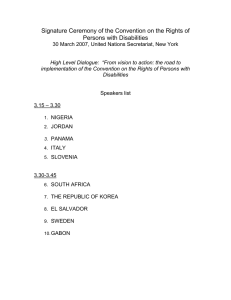
Taxation University of the Philippines v. City Treasurer of Quezon City, June 19, 2019, G.R. No. 214044 FACTS: G.R. No. 214044 is a petition for certiorari and prohibition filed by the University of the Philippines (UP) against the City Treasurer of Quezon City seeking to annul the Statement of Delinquency dated 27 May 2014 addressed to UP as well as the Final Notice of Delinquency dated 11 July 2014 which required UP to pay real property tax on a parcel of land covered by TCT No. RT-107350 (192689), which is currently leased to Ayala Land. The petition also seeks to enjoin the City Treasurer, or any of his agents or representatives, from proceeding with the sale of the subject land at a public auction pursuant to the 11 July 2014 Final Notice of Delinquency. ISSUE: Whether petitioner University of the Philippines is liable for real property tax imposed on the subject property leased to Ayala Land RULING: NO. One source of UP's exemption from tax comes from its character as a government instrumentality. Section 133(o) of the Local Government Code states that, unless otherwise provided by the Code, the exercise of taxing powers of the local government units shall not extend to levy of taxes, fees or charges of any kind on government instrumentalities.31 However, a combined reading of Sections 205 and 234 of the Local Government Code, previously quoted above, also provides for removal of the exemption to government instrumentalities when beneficial use of a real property owned by a government instrumentality is granted to a taxable person. Stated differently, when beneficial use of a real property owned by a government instrumentality is granted to a taxable person, then the taxable person is not exempted from paying real property tax on such property. This is the doctrine used by the City Assessor and the City Treasurer in the present set of facts. The City Assessor and the City Treasurer concluded that ALI is liable for the real property tax on the land that it leased from UP. Republic Act No. 9500, however, gave a specific tax exemption to UP which covers the land subject of the present case. The City Assessor and the City Treasurer overlooked this specific exemption awarded to UP by Republic Act No. 9500. The legislative authority given to UP by Republic Act No. 9500 is the point where the present case differs from our ruling in National Power Corporation v. Province of Quezon (NPC case) which the BLGF-DOF cited in its letter addressed to Mayor Bautista. It is clear from the timeline above that the date of effectivity of UP's legislative charter lies between the date of effectivity of the lease contract between UP and ALI and the dates of issuance of the Statement of Delinquency and Final Notice of Delinquency from the City Treasurer. Republic Act No. 9500, which took effect in 2008, was not yet enacted when UP and ALI entered into their lease contract in 2006. However, Republic Act No. 9500 was already operative when the City Treasurer issued the 1 Taxation Statement of Delinquency and Final Notice of Delinquency to UP in 2014. Republic Act No. 9500 was also operative when the City Assessor issued a Notice of Assessment to ALI in 2012, a Statement of Delinquency to UP North Property Holdings, Inc. in 2012, and a Statement of Delinquency to UP North Property Holdings, Inc. in 2013. The enactment and passage of Republic Act No. 9500 in 2008 superseded Sections 205(d) and 234(a) of the Local Government Code. Before the passage of Republic Act No. 9500, there was a need to determine who had beneficial use of UP's property before the property may be subjected to real property tax. After the passage of Republic Act No. 9500, there is a need to determine whether UP's property is used for educational purposes or m support thereof before the property may be subjected to real property tax. Section 22 of Republic Act No. 9500, previously quoted above, allows UP to lease and develop its land subject to certain conditions. The Contract of Lease between UP and ALI shows that there is an intent to develop "a prestigious and dynamic science and technology park, where research and technology-based collaborative projects between technology and the academe thrive, thereby becoming a catalyst for the development of the information technology and information technology-enabled service." The development of the subject land is clearly for an educational purpose, or at the very least, in support of an educational purpose. UP President Pascual pointed out to City Treasurer Villanueva that Republic Act No. 9500 granted extensive tax exemptions to UP. More specifically, Section 25(a) of Republic Act No. 9500, previously quoted above, provided that all of UP's "revenues and assets used for educational purposes or in support thereof shall be exempt from all taxes and duties." Republic Act No. 9500 bases UP's tax exemption upon compliance with the condition that UP's revenues and assets must be used for educational purposes or in support thereof. There is no longer any need to determine the tax status of the possessor or of the beneficial user to further ascertain whether UP's revenue or asset is exempt from tax. 2



